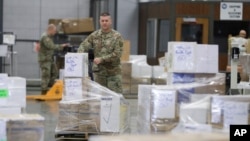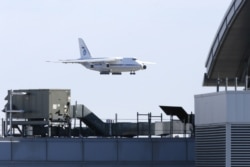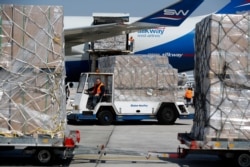U.S. President Donald Trump denied placing a moratorium on overseas shipments of personal protective equipment such as masks and gowns to help other countries, as first reported by Politico.
"Whatever we have, whatever we've committed to, we commit," Trump said during the White House coronavirus briefing on Wednesday. "But we also need a lot for ourselves, so we're very focused on that until we get over this. So obviously, we're not going to be shipping too much."
The Trump administration is asking countries, including South Korea, for testing kits and medical equipment. On Wednesday, a South Korean foreign ministry official confirmed that the U.S. was one of 121 countries that had asked for help with coronavirus testing.
The U.S. has received, either through purchase or donation, supplies from several countries, including China and Russia.
"China sent us some stuff, which was terrific. Russia sent us a very, very large planeload of things, medical equipment, which was very nice," Trump said Monday.
On Wednesday, the U.S. State Department put out a statement confirming the shipment.
"As a follow-up to the March 30 phone call between President Trump and President [Vladimir] Putin, the United States has agreed to purchase needed medical supplies, including ventilators and personal protection equipment, from Russia, which were handed over to FEMA [the Federal Emergency Management Agency] on April 1 in New York City," the statement said.
U.S. health workers are in dire need of medical equipment, particularly ventilators and personal protective equipment, or PPE.
Institutions all over the country are looking to our supply chain, to try to make sure that the incoming PPE over the next two months will be sufficient, said William Schaffner, an infectious-diseases specialist at the Vanderbilt University Medical Center.
"There are uncertainties and anxieties about that," Schaffner said. "And we're using what we have now with great care so there's no waste."
Global role
While the U.S. focuses on its domestic needs, some analysts warn it cannot back away from its global leadership during this pandemic, particularly when China and Russia are eager to take on that role.
"The United States can walk and chew gum at the same time," said Daniel Runde, director of the Project on Prosperity and Development, at the Center for International and Strategic Studies. "We can respond to our immense domestic emergency while at the same time respond to the global COVID emergency."
Runde warned of "dire consequences" of ignoring partners at a time of need — partners in trade, security and counterterrorism. While the U.S. should prioritize medical equipment supply for domestic needs, he said, there are other ways to help, including providing funding for handwashing and social distancing public service announcements, supporting factories to make masks and other capacity-building efforts.
"We have to be seen as helping solve other countries' COVID problems, because otherwise they're going to turn to China," Runde said, "They're going to remember this."
Last week, the U.S. pledged additional foreign aid to battle COVID-19, providing an initial $274 million in emergency health and humanitarian assistance to 64 at-risk countries, in addition to funding that has been provided to multilateral organizations, including the World Health Organization.
VOA's Nike Ching contributed to this report.









